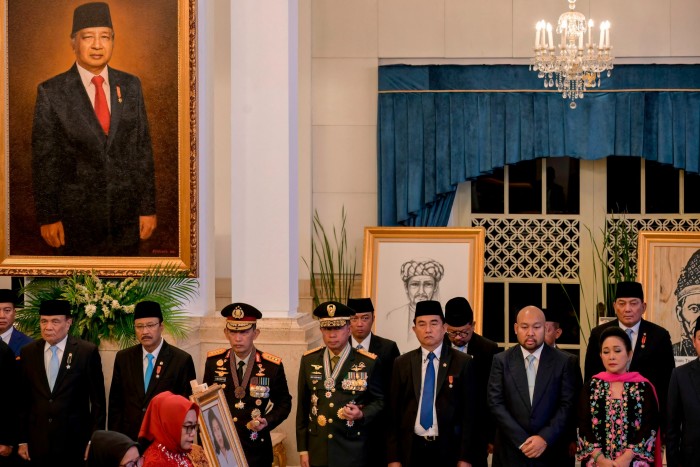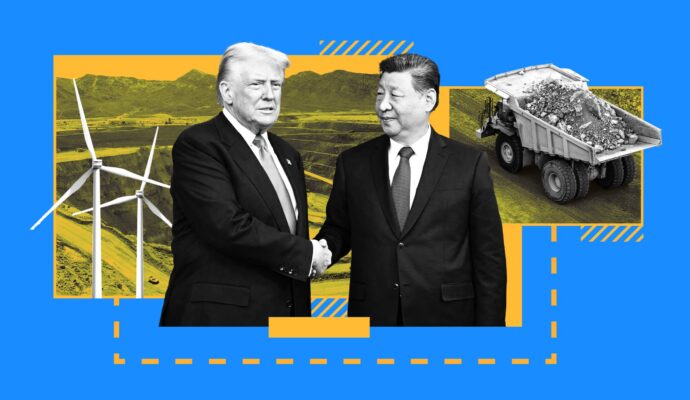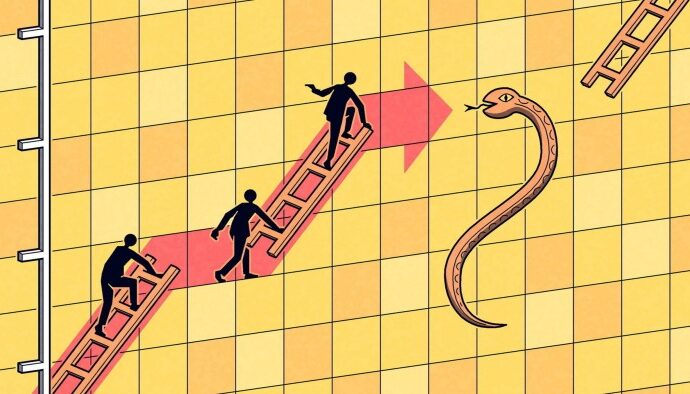Unlock the Editor’s Digest for free
Roula Khalaf, Editor of the FT, selects her favourite stories in this weekly newsletter.
Indonesia has elevated former president Suharto to the status of “national hero”, bestowing the title on the late dictator whose 32-year regime was marred by allegations of corruption and human rights abuses.
President Prabowo Subianto conferred the title on the ex-leader alongside with nine others on National Heroes’ Day, when Indonesian citizens are honoured for outstanding contributions to the nation.
The government cited Suharto’s contribution to Indonesia’s independence struggle, without mentioning his controversial tenure as president, which was ended by a popular uprising in 1998.
Suharto, who died in 2008 at the age of 86, had been considered by two previous administrations for the honour. This year, his nomination was put forward by the social affairs ministry and confirmed by Prabowo, a former general who has long expressed admiration for Suharto.
The designation has triggered a backlash in Indonesia, where Prabowo — Suharto’s former son-in-law — has strengthened the military’s role in government, and has drawn accusations of whitewashing past abuses.
As Prabowo handed the award to Suharto’s family at the presidential palace on Monday, an announcer hailed the former leader as “a hero in the [independence] struggle” against colonial power the Netherlands and wartime occupier Japan.

Suharto is a polarising figure in Indonesia. Often called “Indonesia’s father of development”, he is credited with steering rapid economic growth and industrialisation after he came to power in 1967, bringing tens of millions out of poverty and forging the country’s middle class.
But under his military rule, the government did not tolerate any criticism and crushed opposition. Suharto’s family and cronies are also accused of enriching themselves with billions of dollars through kickbacks. Transparency International estimated Suharto and his family’s ill-gotten gains at $35bn, accusing them of “systematically looting” the country.
Suharto’s rise to power was also marred by violence. In 1965-66, he led the military in a brutal anti-communist purge that resulted in mass killings. At least 500,000 alleged sympathisers of the Indonesian Communist party were killed, and more than 1mn people were jailed, according to rights groups — though some estimates put the death toll higher.
The resulting turbulence paved the way for Suharto to take over from Indonesia’s first president, Sukarno.
Under Suharto’s presidency, Indonesia invaded East Timor in 1975, beginning a 24-year occupation that was marked with hundreds of thousands of deaths and accusations of war crimes, according to independent investigators. East Timor was eventually recognised as the independent state of Timor-Leste.
Suharto’s tight grip on power came to an end in May 1998 as the Asian financial crisis exacerbated economic and social discontent, triggering deadly protests calling for his resignation.
Prabowo, then the head of Indonesia’s special military forces, was accused of involvement in the abduction of pro-democracy activists during the unrest. He was eventually fired from the military over the allegations. He has always denied any wrongdoing.
“The attempt to make Suharto a national hero is the greatest betrayal of the people’s mandate since 1998,” said Usman Hamid, executive director of Amnesty International Indonesia. He added that the move undermined reforms since Suharto’s ousting.
“Awarding the hero title to Suharto could be interpreted as an attempt to erase past sins or to perpetuate impunity by the government,” said Dimas Bagus Arya, a co-ordinator at human rights group Kontras. “The nation’s dignity is being compromised.”
Siti Hardijanti Rukmana, one of Suharto’s daughters, thanked Prabowo, saying the president’s decision to honour her father was “based on the aspirations of the people”.
She added: “What’s important is that we are seeing what my father had done from his youth until his death — his struggle for the nation, state, and the Indonesian people.”


